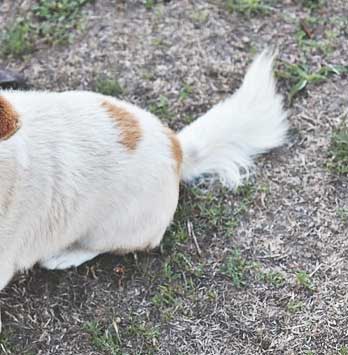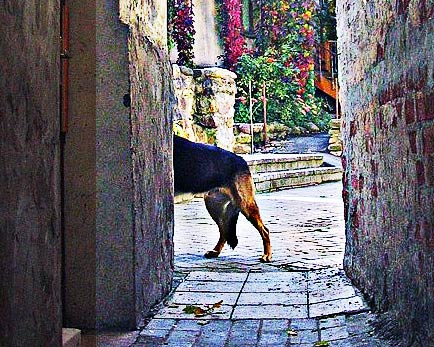Most dog owners have experienced the mortification of watching their pet engage in embarrassing behavior. Whether it’s humping a stuffed animal in front of company or peeing on the neighbor’s flower bed, these awkward moments can be hard to forget. However, it’s important to remember that dogs are simply following their instincts and are not intentionally trying to embarrass their owners. In fact, many embarrassing behaviors can actually be quite normal for dogs. Like a dog scooting its butt on the floor for instance.
For example, mounting is a way for dogs to assert their dominance, and urine marking is often used as a means of communication. While these behaviors may be natural, they can still be frustrating for owners. The good news is that there are a number of ways to prevent or curb embarrassing dog behavior. With patience and perseverance, even the most well-meaning pups can learn to mind their manners.
So why is my dog scooting its butt along the floor?
Have you ever noticed your dog dragging its butt across the floor? This behavior, known as scooting, is fairly common and can have a variety of causes. Sometimes, it’s simply a case of anal glands that need to be expressed. However, it can also be a sign of worms or other parasites.
If your dog is scooting frequently, it’s best to take them to the vet for a checkup. Additionally, you should make sure to keep their hind area clean and dry. Regular baths and thorough drying can help to minimize the risk of infection. With a little care, you can help keep your dog healthy and happy.
Top reasons your dog may be scooting on the floor:
- Anal gland irritation: Anal glands are scent glands located at the four and eight o’ clock position of your dog’s rectum, and when these become irritated or impacted, dogs tend to scoot along the ground in an attempt to relieve the discomfort by expressing the glands externally.
- Food allergies or sensitivities: If your dog has a food allergy or sensitivity, it may cause the area around their anus to become inflamed and irritated, leading to scooting.
- Worms or parasites: Certain parasites, such as tapeworms, can cause your dog to experience discomfort and itching around their rectum. Scooting may be a sign of an infestation.Full anal
- Skin allergies: Allergies can also occur on the skin around the anus, causing irritation that leads to scooting.
- Skin irritation: If your dog has allergies or skin irritations, they may scoot in order to try to relieve the itchiness or inflammation in the affected area.

How to stop a dog scooting his butt across the floor
If your dog has developed the habit of rubbing its butt on the floor, there are a few things you can do to help stop the behavior. First, make sure that your dog is well-groomed. A dirty or matted coat can be irritating to the skin, which may be why your dog is rubbing its butt on the floor.
Give your dog a good brushing, and make sure to keep its coat clean and free of tangles. You may also want to consider using a de-shedding shampoo to help reduce the amount of fur that sheds. In addition, make sure that your dog has access to plenty of fresh water.
A dry, itchy coat is often the result of dehydration, so increasing your dog’s water intake can help to alleviate the problem. Finally, if the problem persists, consider taking your dog to the vet for a checkup. There may be an underlying medical condition that is causing the irritation, and a vet will be able to offer guidance on how to best treat the problem.
When should I worry about dog scooting?
If your dog has been scooting his butt on the floor for more than a few days and doesn’t seem to be getting any better, it’s important to take him to the veterinarian. Scooting can be caused by a variety of medical issues such as an anal sac infection or impacted anal glands, as well as skin allergies and other intestinal problems. Your veterinarian will be able to diagnose the issue and recommend treatment.
It is also important to make sure your dog’s anal area is kept clean, as this can help reduce irritation and infection. In some cases, dietary changes may be necessary if an underlying food intolerance or allergy is causing the scooting. Finally, if your dog has long hair around his anus, it may need to be trimmed or removed to help keep the area clean and reduce irritation.
In general, it’s important to consult a veterinarian if your dog has been scooting consistently for more than a few days. The sooner you address the cause of the problem, the better chance your dog will have of getting relief quickly.
What is the cure for scooting in a dog?
The most common cause of scooting in dogs is due to irritation or discomfort caused by the presence of fecal material around the anus.
- The best way to address this issue is to keep your dog’s anal area clean and well groomed.
- Regularly check for any signs of irritation, such as redness, swelling or discharge, and contact your veterinarian if these symptoms persist. Your vet may then recommend medications or other treatments, such as a high-fiber pumpkin for dogs in his diet, to help relieve the irritation and reduce scooting.
- Additionally, it is important to routinely worm your pet for parasites that can cause scooting and other complications. Making sure your dog receives regular exercise will also help to reduce scooting behavior. If these measures do not work, a visit to the veterinarian will help diagnose any underlying medical issue and ensure that the best course of action is taken to address it.
Does dog scooting always mean worms?
No, a dog scooting his butt on the floor or ground does not always indicate the presence of worms. While parasites can be a cause of scooting behavior, other conditions such as allergies or anal sac problems can also cause dogs to drag their bottoms on the ground. It is important to consult your veterinarian if you observe this behavior in order to determine the underlying cause and address it accordingly.
It is important to note that scooting in dogs can be caused by other conditions as well, such as allergies or skin infection. If you suspect that your pet may have a condition, it is important to seek veterinary care immediately. Early treatment are essential for providing the best outcome for your pet.
No matter what the cause of scooting in your dog may be, prompt attention to the issue is key.
Dog scooting his butt after pooping
After your dog finishes doing their business, you may notice them scooting along the ground which isn’t as bad as the dog eating poop. This surprisingly common behavior is often caused by an anal gland impaction, which occurs when the glands become filled with too much fluid. In order to relieve the pressure, your dog will drag their bottom along the ground, resulting in the unpleasant scooting behavior.
If you notice your dog scooting frequently, it’s important to take them to the vet for a checkup. Anal gland impactions can be painful and may require medical treatment to resolve. With proper care, your dog should be able to enjoy a comfortable and scoot-free life.
How to clean a dog after pooping
After your dog does their business, it’s time for you to clean up the mess. First, use a scoop or spade to remove any solid waste. If there is any remaining residue, you can use a garden hose to wash it away. Next, wipe down your dog’s back end with a wet cloth or paper towel. Be sure to get in between the folds of skin to remove any faeces that may be trapped there. Finally, give your dog a good brushing to remove any dirt or debris that may be clinging to their fur. By following these simple steps, you can keep your dog clean and help prevent them from tracking faeces into the house.
How to reduce mess after a dog has pooped
Any dog owner knows that one of the least pleasant parts of owning a pet is picking up after them when they go to the bathroom. Unfortunately, there is no way to avoid this entirely, but there are a few things you can do to make the process less messy. First, if possible, choose an area for your dog to do their business that is on grass or another type of soft surface.
This will reduce the amount of residue that gets left behind on your shoe or in your yard. Second, invest in a good pooper scooper and make sure to use it promptly after your dog goes. This will help to remove most of the waste and prevent it from spreading around. Finally, be sure to wash your hands thoroughly after handling any dog waste, even if you are wearing gloves. By following these simple tips, you can make cleaning up after your dog a little bit less unpleasant.
In conclusion
In conclusion, a dog scooting its butt across the carpet is usually trying to relieve an itchy or uncomfortable sensation. The most common causes of this itchiness are allergies, anal glands that need expressed, or parasites. If your dog is scooting and you’re unsure of the cause, it’s always best to consult with your veterinarian to rule out any serious health concerns.
In the meantime, there are a few things you can do to help your dog feel more comfortable, like using a therapeutic shampoo during baths and giving them regular anal gland expression if needed. With a little patience and detective work, you and your dog can get to the bottom of this itchy issue.
If your dog is repeatedly scooting, it’s best to take them to the vet to rule out any serious health problems and get proper treatment. In the meantime, you can try wiping their bottom with a wet cloth or giving them a soothing bath. With a little TLC, your furry friend will be feeling better in no time.
